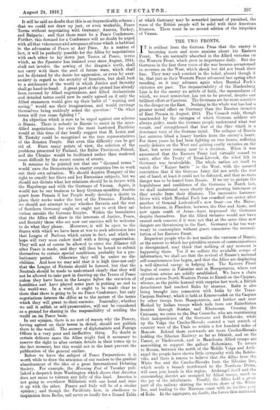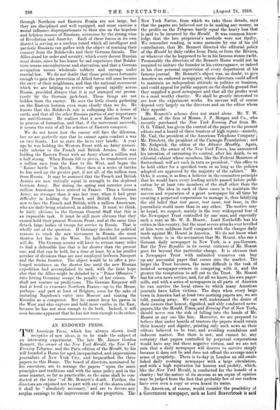THE TWO FRONTS.
IT is evident from the German Press that the enemy is becoming more and more anxious about his Eastern Front. We are naturally absorbed in the Allied victories on the Western Front, which grow in importance daily. But the Germans in the first three years of the war became accustomed to reverses on the West, which shook but did not break their line. They may seek comfort in the belief, absurd though it be, that just as their Western Front advanced last spring after receding, so it may advance again when Marshal Foch's victories are past. The impenetrability of the Hindenburg Line is for the enemy an article of faith, the unsoundness of which, we must remember, has yet to be proved, despite our brilliant effort at Cambrai. The Germans are far more sensitive to the danger on the East. Nothing in the whole war has had a greater moral effect on Germany than the Russian invasion of East Prussia in August, 1914. The Cossack raids, though unattended by the outrages of which German soldiers are always guilty, made the German people understand what war meant, and strengthened that fear of the Slav which is a dominant trait of the German mind. The collapse of Russia last autumn lifted a heavy burden from the enemy's heart. For three years he had been fighting on two fronts, suffering costly defeats on the West and gaining costly victories on the East, but never coming near to a decision. When it was announced that the Eastern Front had virtually ceased to exist, after the Treaty of Brest-Litovsk, the relief felt in Germany was incalculable. The whole nation set itself to watch the " Kaiser battle " in the West, with the assured conviction that if the German Army did not settle the war out of hand, at least it could not be defeated, and that no more danger was to be feared from Russia. If we try to picture the hopefulness and confidence of the Germans in March last, we shall understand more clearly their growing bitterness as they awake from their illusions. The successive hammer- blows with which Marshal Foch has smashed ono sector after another of General Ludendorff's new front—on the Manic, before Amiens, in Flanders, between the Oise and Aisne, and now again south of Arras—have impressed the Germans despite themselves. But the Allied victories would not have caused such concern if it were not that at the same time new dangers are threatening in the East. Germany is far too war- weary to contemplate without grave uneasiness tho reconsti- tution of her Eastern Front.
Impatient people who do not realize the vastness of Russia, or the extent to which her primitive system of communications is disorganized, may think that nothing of any moment is happening there. Yet if we collate the available scraps of information, we shall see that the revival of Russia's national self-consciousness has begun, and that the Allies are displaying a well-directed energy in helping her. The Eastern Front begins of course in Palestine and in Mesopotamia, where our victorious armies are solidly established. We have a chain of posts across North-Western Persia to Enzeli on the Caspian, whence, as the public learned with surprise last week, a British detachment had reached Baku by steamer. Baku is also being brought into connexion with India by the Trans- Caspian Railway, which is held at Krasnovodsk on the Caspian by other troops from Mesopotamia, and further oast near Meshed by Indian troops which rode from our Baluchistan frontier through Seistan and Khorassan. Crossing the Caucasus, we come to the Don Cossacks, who are maintaining their independence of the Germans and Bolsheviks, while up the Volga the Czecho-Slovaks control a vast stretch of country west of the Urals to within a few hundred miles of Moscow. Behind them eastwards aro more Czecho-Slovaks holding the Siberian Railway as far as Irkutsk, and on the Ussuri, at Vladivostok, and in Manchuria Allied troops are assembling to support the gallant Bohemians. To return to Russia, between the north of the Middle Volga and Arch- angel the people have shown little sympathy with the Bolshe- viks, and there is reason to believe that the Allies from the White Sea and the Czecho-Slovaks from the Siberian lino, which sends a branch northward to the Northern Dvina, will soon join hands in this region. Archangel itself and the surrounding district are occupied by Allied troops, much to the joy of the inhabitants. Finally, the Allies hold a great part of the railway skirting the western shore of the Sea, and leading to the Murman coast with its ice-free port of Kola. In the aggregate, no doubt, the forces thus scattered through Northern and Eastern Russia are not large, but they are disciplined and well equipped, and must exercise - moral influence disproportionate to their size on the hopeless and helpless masses of Russians, overcome by the strong wine of Revolution and Anarchy. Each of these forces in its own district is serving as a nucleus round which all intelligent and patriotic Russians can gather with the object of rescuing their country from the Bolsheviks and their German friends. The Allies stand for order and security, which every decent Russian must desire, since he has learnt by sad experience that Bolshe- vism means unemployment and starvation, and that a German occupation means wholesale robbery and outrage under martial law. We do not doubt that those provinces fortunate enough to gain the protection of Allied forces will soon become the envy of their neighbours, and that the national movement which we are helping to revive will spread rapidly across Russia, provided always that it is not stamped out prema- turely by the German jack-boot. These things are not hidden from the enemy. He sees the little clouds gathering on the Eastern horizon even more clearly than we do. He knows that the Bolshevik rule is collapsing like a house of cards, and that all the other Russian parties of any importance are anti-German. He realizes that a new Eastern Front is in process of formation, and that, if the movement succeeds, it means the ruin of all his schemes of Eastern conquest.
We do not know how the enemy will face the dilemma, but we are perfectly sure that he cannot again conduct a war on two fronts. Let us state the facts very briefly. A year ago he was holding the Western Front with an Army numeri- cally inferior to the French and British Armies. He was holding the Eastern Front with an Army about a million and a half strong. When Russia fell to pieces, he transferred over a million men from the East to the West, and began the " Kaiser battle " in March. Since then in a series of battles he has used up the greater part, if not all, of the million men from Russia. It may be assumed that the' rench and British Armies are now virtually equal in strength to the depleted German Army. But during the spring and summer over a million Americans have arrived in France. Thus a German Army, no stronger than it was last year, when it had great difficulty in holding the French and British Armies, has now to face the French and British, with a million Americans, who are daily being reinforced, in addition. It must, we think, be fairly obvious to the German General Staff that this is an impossible task. It must be still more obvious that they cannot hold their present Western Front., and at the same time detach large bodies of troops for service in Russia. That is wholly out of the question. If Germany decides for political reasons to crush the new movement in Russia, she must shorten her lino in the West. No half-and-half measures will do. The German armies will have to retreat many miles to find a defensible lino that is far shorter than the present one, and that can be held, for a time at least, by a far smaller number of divisions than are now employed between Nieuport and the Swiss frontier. The object would be to offer a pro- longed resistance on the shorter line until the new Russian expedition had accomplished its task, with the faint hope also that the Allies might be deluded by a " Peace Offensive " into letting Germany escape the penalty of her crimes. We shall not venture on predictions. The German Emperor will find it hard to evacuate Northern France—up to the Meuse, perhaps—and part at. least of Belgium, even for the sake of imitating Napoleon's entry into Moscow and visiting the Kremlin as a conqueror. But he cannot keep his pawns in the West and also capture and hold more castles in the East, because he has not men enough to do both. Indeed, it, will soon become apparent that he has not men enough to do either.



























 Previous page
Previous page